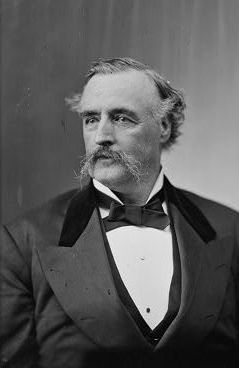William Fletcher Sapp facts for kids
Quick facts for kids
William Fletcher Sapp
|
|
|---|---|
 |
|
| Member of the U.S. House of Representatives from Iowa's 8th district |
|
| In office March 4, 1877 – March 3, 1881 |
|
| Preceded by | James W. McDill |
| Succeeded by | William Peters Hepburn |
| Member of the Iowa House of Representatives | |
| In office 1865 |
|
| Personal details | |
| Born | November 20, 1824 Danville, Ohio |
| Died | November 22, 1890 (aged 66) |
| Political party | Republican |
| Residence | Council Bluffs, Iowa |
| Profession | Attorney |
William Fletcher Sapp (born November 20, 1824 – died November 22, 1890) was an important American politician. He served as a United States Attorney and later as a U.S. Representative for Iowa. He was a member of the Republican Party. His uncle, William R. Sapp, was also a U.S. Representative from Ohio.
Contents
Early Life and Education
William Fletcher Sapp was born in Danville, Ohio. He went to public schools and later attended Martinsburg Academy. After his schooling, he decided to study law.
Becoming a Lawyer
In 1850, William Sapp passed his exams and was allowed to practice law. This is called being "admitted to the bar." He started his law career in Mount Vernon, Ohio. In 1850, he tried to become the prosecuting attorney for Knox County, Ohio but did not win. However, he was elected to that position four years later in 1854 and was re-elected in 1856.
Moving West and Military Service
In 1860, Sapp moved to Omaha, Nebraska. This was a new and growing territory at the time.
Service in Nebraska Territory
In 1861, he was appointed as the adjutant general of Nebraska Territory. This was a high-ranking military position. He also served as a member of the Territorial legislative council, which helped make laws for the territory.
Joining the Union Army
During the American Civil War, William Sapp joined the Union Army in 1862. He served as a lieutenant colonel in the 2nd Nebraska Cavalry. He stayed in the army until he was officially released from service.
Political Career in Iowa
After his time in the military, William Sapp moved to Council Bluffs, Iowa. There, he continued his work as a lawyer.
Iowa State Representative
In 1865, he began serving as a member of the Iowa House of Representatives. This meant he helped create laws for the state of Iowa.
United States Attorney
After his time in the state legislature, Sapp became the United States Attorney for the District of Iowa. He held this important legal role from 1869 to 1873.
Serving in Congress
In 1876, William Sapp was elected to the United States House of Representatives. He represented Iowa's 8th congressional district as a Republican. He served in the 45th United States Congress. He was re-elected and served again in the 46th United States Congress.
He served in Congress from March 4, 1877, to March 3, 1881. In 1880, he tried to be nominated again for Congress but was not chosen. Another former Civil War officer, William Peters Hepburn, won the nomination instead.
Later Life and Legacy
After leaving Congress, William Sapp went back to practicing law in Iowa. He continued his legal work until his death.
He passed away in Council Bluffs, Iowa, on November 22, 1890. He was buried in Mound View Cemetery in Mount Vernon, Ohio.

